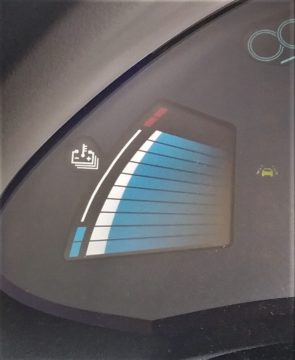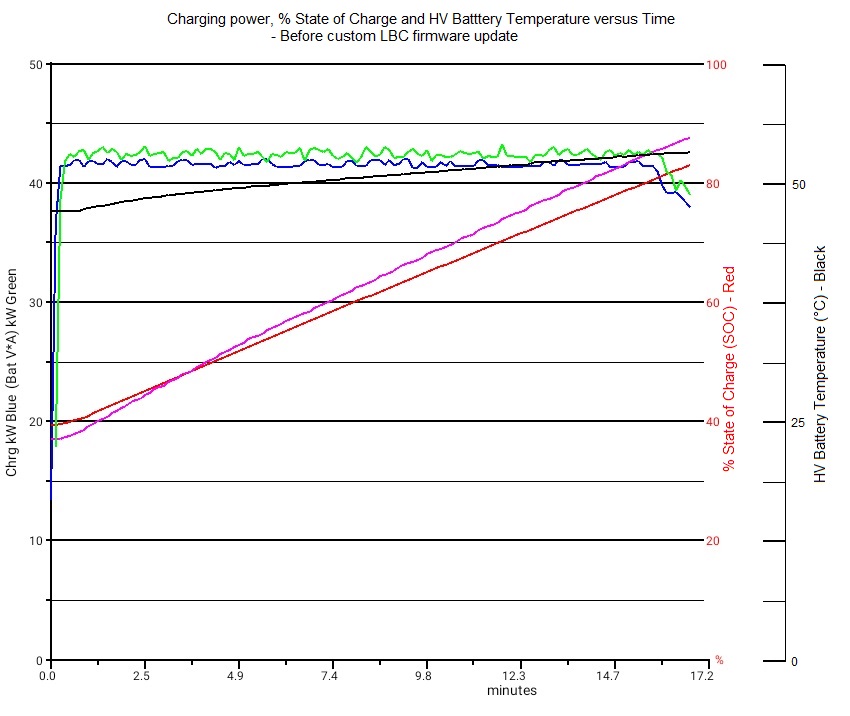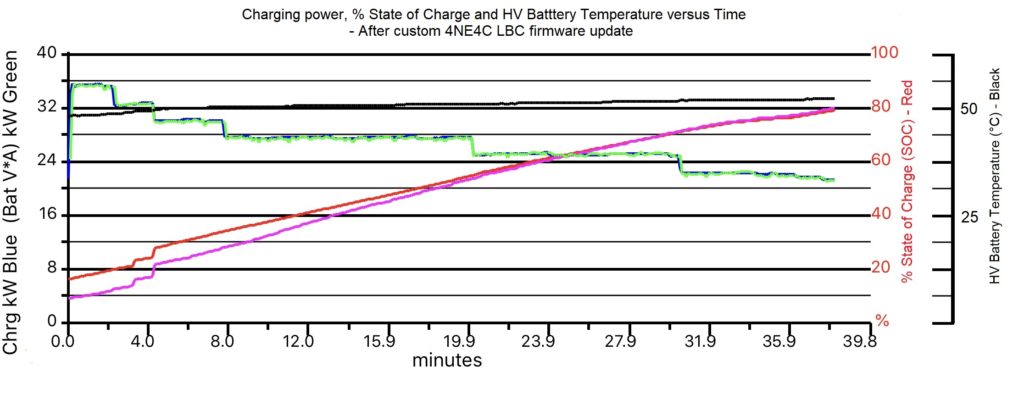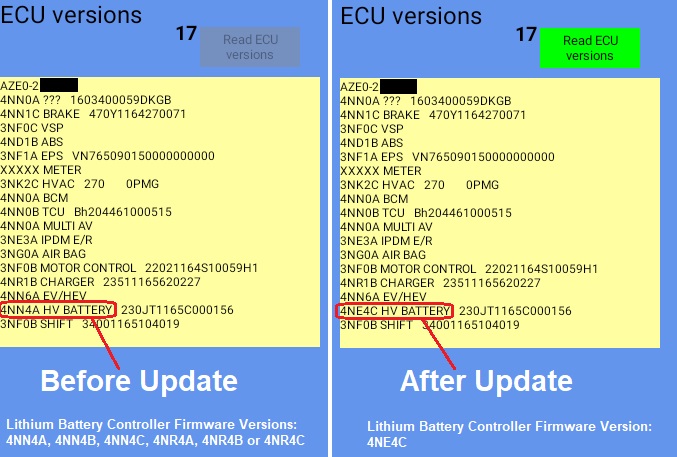When using DC fast charging, the 30kWh Leaf has always enjoyed faster charging times when compared to the previous 24kWh models. The reduced charging times were achieved not by increasing the peak charging power, but by holding the peak charging power for significantly longer during a charge. There is some logic in terms of why Nissan engineers felt this was appropriate, as the cathode in the cells used for the 30kWh Leaf introduced cobalt which is known for allowing for increased stability and reliability.
Unfortunately, the 30kWh Leaf’s fast charging strategy took very little notice of the battery temperature. As many owners of these vehicles can confirm, on a long distance journey involving several fast charges, it is surprisingly easily to push the battery temperature gauge up to the point of indicating dangerous levels just by driving at the open road speed limit and fast charging at the appropriate stops. The driver obviously has control over how aggressively the car is driven, but the moment that a fast charging session has begun the situation is no longer in their hands. The control gets passed to the vehicle which decides how aggressively to charge up to the limitation of what the fast charger can deliver. The problem with the 30kWh Leaf is that if you roll up to a fast charger with an already hot battery, it takes very little notice of this and proceeds to smash the maximum current of around 120A into the battery pack for most of the charging session – effectively doing everything it can to make the problem worse.


If you continue this heating cycle of driving and fast charging then you are risking an increased rate of battery capacity loss at best and outright failure of a battery cell at worst. That may sound extreme, but we have repaired the batteries of several 30kWh Leafs whose cells have ruptured under these exact circumstances, namely, on or immediately following road trips associated with multiple episodes of fast charging.
The ideal solution would of course be to actively cool the battery pack. However, Nissan executives have stated on several occasions that their expectation is that most Leaf owners will not drive far each day and that they decided that the additional cost of a thermal management system (TMS) for the battery was not warranted. That may be a reasonable generalisation for many, but we think it is fully understandable that many 30kWh Leaf owners (including ourselves) have the desire to sometimes take their cars on long distance trips – after all the cars are very enjoyable to drive and capable of doing long trips thanks to ever improving fast charging infrastructure.
Nissan took lessons that they learned about overheating 30kWh Leafs and applied this when designing the 40kWh Leaf (released in 2017) which features ‘battery safeguarding technology’. That’s a fancy way of saying that the fast charging power is progressively reduced based on battery temperature. Nissan was arguably too conservative with their first version of this which led to complaints about excessively long charging times, the term ‘RapidGate’ being coined and eventually a firmware update for the 40kWh lithium battery controller (LBC).
Therefore, it was quite surprising to us that when Nissan released an LBC firmware update for the 30kWh Leaf in 2018, they did not bother to implement any practical ‘battery safeguarding technology’ which we found quite disappointing. Perhaps Nissan feared a potential backlash from customers if they did anything to restrict one easily measurable metric (fast charging time), even if that would have increased the longevity of the most expensive component in the vehicle. Nissan also has little to no incentive to make battery packs last longer than guaranteed by their warranty threshold and that threshold is measured in ‘bars’ which are in undisclosed units that can be easily modified (which has been done with some previous Nissan firmware updates).
Fortunately for long-distance loving 30kWh Leaf owners, we’ve solved this problem with our own custom firmware LBC update. With our own custom firmware LBC update in place, quick charge current is adjusted accordingly based on battery temperature. We believe this strikes a great balance between battery temperature and charging speed to enable Leaf owners to enjoy getting out on the open road without needing to be as concerned about the welfare of their beloved EV.

Q: How is this firmware update applied?
A: The firmware is uploaded to the Lithium Battery Controller (LBC) which is physically inside the battery pack, however the update can be performed through the cars OBDII port without any disassembly of any part of the car.
Q: Can all 30kWh Leafs be updated?
A: Currently any model with LBC firmware version 4NN4A, 4NN4B, 4NN4C, 4NR4A, 4NR4B or 4NR4C can be updated to our custom firmware. Models with 4NN6A or 4NR6A are also now supported. due to a recent update
Q: How can a car with this custom firmware update be identified?
A: Our firmware code is 4NE4C. It is clearly visable using any diagnostics tool that can read the ECU part numbers. An example is shown below of a car before and after being updated.

Q: Does this update limit fast charging speeds all the time?
A: Absolutely not. The fast charging speeds are completely unaffected when the battery is at a happy temperature (below approx 40 degrees C). For most people, the first 2 fast charges will be at normal speed. However, as the battery temperature starts creeping up the charging current is progressively reduced. Our design goal was to to complete a trip of up to 500km under normal circumstances without the battery temperature exceeding 50 degC.
Q: Should everyone who has a Leaf capable of getting this update get it done?
A: No. If you only ever use your 30kWh Leaf for short daily commutes and never perform multiple fast charges in a day then our update will be of no benefit to you. For anyone else who routinely or occasionally does longer trips with multiple fast charges involved, we certainly recommend having this update completed.
Q: Will applying this update affect my aftermarket mechanical breakdown insurance policy (if applicable)?
A: It shouldn’t. Mechanical breakdown insurance companies should be delighted to have this custom update applied to vehicles that they cover as it reduces their risk of a failure. However, to be on the safe side, we recommend checking your policy or making an enquiry with your provider. If your provider gives a unfavourable response then please contact us and we’ll be happy to discuss it with them.
Q: Is this firmware update reversible?
A : Absolutely. As part of the testing process we have swapped our test vehicles back to the ‘official’ firmware many times with ease. However, this is likely hypothetical as we very much doubt that anyone with our firmware will ever want to go back.
Address:
14 Mowbray Street
Waltham – 8023
Christchurch
New Zealand
Dates are services are subject to availability. Our service centres hours are 8am to 5pm Monday to Friday. One of our team will contact you within 2 working days to confirm your booking. Alternatively, you can contact our service centre for bookings on 032818572
Are you a business interested in becoming an EVs Enhanced Partner? Click the button on the right to get in touch!